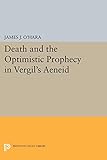Death and the Optimistic Prophecy in Vergil's AENEID / James J. O'Hara.
Material type: TextSeries: Princeton Legacy Library ; 1062Publisher: Princeton, NJ : Princeton University Press, [2014]Copyright date: ©1990Edition: Course BookDescription: 1 online resource (220 p.)Content type:
TextSeries: Princeton Legacy Library ; 1062Publisher: Princeton, NJ : Princeton University Press, [2014]Copyright date: ©1990Edition: Course BookDescription: 1 online resource (220 p.)Content type: - 9780691606576
- 9781400860876
- 873.01
- PA6825 .D384 2014
- online - DeGruyter
- Issued also in print.
| Item type | Current library | Call number | URL | Status | Notes | Barcode | |
|---|---|---|---|---|---|---|---|
 eBook
eBook
|
Biblioteca "Angelicum" Pont. Univ. S.Tommaso d'Aquino Nuvola online | online - DeGruyter (Browse shelf(Opens below)) | Online access | Not for loan (Accesso limitato) | Accesso per gli utenti autorizzati / Access for authorized users | (dgr)9781400860876 |
Frontmatter -- CONTENTS -- ACKNOWLEDGMENTS -- ABBREVIATIONS USED IN TEXT AND FOOTNOTES -- INTRODUCTION -- CHAPTER ONE. Orontes, Palinurus, Anchises, and Pallas: Prophecy and Deaths Before the Eyes of Aeneas" -- APPENDIX TO CHAPTER ONE. TYPICAL FEATURES OF PROPHECY SCENES -- CHAPTER TWO. The Gods and the Confidence of Bold Turnus" -- CHAPTER THREE. Prophecy and the res laetak That Await Aeneas -- APPENDIX TO CHAPTER THREE. INCONSISTENCIES IN PROPHECIES AND THE "SOLUTION FROM THE CHARACTER SPEAKING" -- CHAPTER FOUR. The Prophecies of Rome -- APPENDIX TO CHAPTER FOUR THE SHIELD OF AENEAS -- CHAPTER FIVE. Vergil as Poet-Prophet of the Aeneid -- BIBLIOGRAPHY -- INDEX LOCORUM -- INDEX RERUM ET NOMINUM
restricted access online access with authorization star
http://purl.org/coar/access_right/c_16ec
Here James O'Hara shows how the deceptive nature of prophecy in the Aeneid complicates assessment of the poem's attitude toward its hero's achievement and toward the future of Rome under Augustus Caesar. This close study of the language and rhetorical context of the prophecies reveals that they regularly suppress discouraging material: the gods send promising messages to Aeneas and others to spur them on in their struggles, but these struggles often lead to untimely deaths or other disasters only darkly hinted at by the prophecies. O'Hara finds in these prophecies a persistent subtext that both stresses the human cost of Aeneas' mission and casts doubt on Jupiter's promise to Venus of an "endless empire" for the Romans. O'Hara considers the major prophecies that look confidently toward Augustus' Rome from the standpoint of Vergil's readers, who, like the characters within the poem, must struggle with the possibility that the optimism of the prophecies of Rome is undercut by darker material partially suppressed. The study shows that Vergil links the deception of his characters to the deceptiveness of Roman oratory, politics, and religion, and to the artifice of poetry itself. In response to recent debates about whether the Aeneid is optimistic or pessimistic, O'Hara argues that Vergil expresses both the Romans' hope for the peace of a Golden Age under Augustus and their fear that this hope might be illusory.Originally published in 1990.The Princeton Legacy Library uses the latest print-on-demand technology to again make available previously out-of-print books from the distinguished backlist of Princeton University Press. These editions preserve the original texts of these important books while presenting them in durable paperback and hardcover editions. The goal of the Princeton Legacy Library is to vastly increase access to the rich scholarly heritage found in the thousands of books published by Princeton University Press since its founding in 1905.
Issued also in print.
Mode of access: Internet via World Wide Web.
In English.
Description based on online resource; title from PDF title page (publisher's Web site, viewed 30. Aug 2021)


